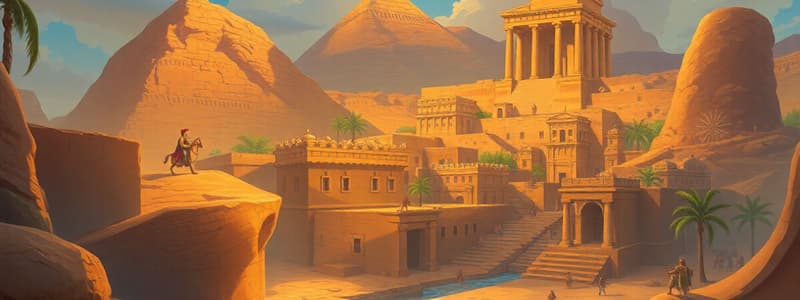Podcast
Questions and Answers
Which of the following best defines the timeline of Rome's development?
Which of the following best defines the timeline of Rome's development?
- 753-509 BC as a city, 509-27 BC as a Republic, 27 BC - AD 476 as an Empire. (correct)
- 27 BC - AD 476 as a city, 509-27 BC as an Empire, 753-509 BC as a kingdom.
- 509-27 BC as a Republic, 27 BC - AD 476 as a city, 753-509 BC as an Empire.
- 753-509 BC as a Republic, 509-27 BC as a city, 27 BC - AD 476 as a kingdom.
What was the significance of the twin brothers Romulus and Remus in Roman mythology?
What was the significance of the twin brothers Romulus and Remus in Roman mythology?
- They structured the first Roman government.
- They were the first emperors of Rome.
- They defined the boundaries of the Roman Empire.
- Their conflict led to the establishment of Rome. (correct)
Which geographic location marked the limits of the Roman Empire in the east?
Which geographic location marked the limits of the Roman Empire in the east?
- The Caspian Sea
- The Euphrates River (correct)
- The Bosporus Strait
- The Nile River
Which term best describes the lifestyle of the indigenous North Africans before the arrival of the Phoenicians?
Which term best describes the lifestyle of the indigenous North Africans before the arrival of the Phoenicians?
During which period did Rome expand to dominate the entire Italian peninsula?
During which period did Rome expand to dominate the entire Italian peninsula?
What was the status of North African citizenship during the period of the Roman Empire?
What was the status of North African citizenship during the period of the Roman Empire?
Which of the following was NOT one of the notable indigenous tribes mentioned?
Which of the following was NOT one of the notable indigenous tribes mentioned?
What motivated the initial territorial expansions of Rome?
What motivated the initial territorial expansions of Rome?
What significant role did Carthage play in ancient North Africa?
What significant role did Carthage play in ancient North Africa?
Which of the following regions was included in the ancient area known as the Maghreb?
Which of the following regions was included in the ancient area known as the Maghreb?
What marked the end of Carthage's prominence in North Africa?
What marked the end of Carthage's prominence in North Africa?
Which historical figure is traditionally credited with founding Rome?
Which historical figure is traditionally credited with founding Rome?
What impact did Rome's presence in North Africa have on future legal systems?
What impact did Rome's presence in North Africa have on future legal systems?
During which period did Rome expand its influence in North Africa?
During which period did Rome expand its influence in North Africa?
What culture significantly influenced the native Berber population in ancient North Africa?
What culture significantly influenced the native Berber population in ancient North Africa?
Which ancient settlement is linked to the Phoenicians and its role in Roman African civilization?
Which ancient settlement is linked to the Phoenicians and its role in Roman African civilization?
Flashcards are hidden until you start studying
Study Notes
North Africa in Classical Antiquity
- North Africa, excluding Egypt, Ethiopia, and Cyrenaica, was known as part of East Africa by Romans.
- Ancient North Africa consisted of modern Morocco, Algeria, Tunisia, and Western Libya, referred to as the Maghreb by Arabs.
- The Berbers were the dominant native population, particularly in Numidia.
- Phoenicians established trading settlements in North Africa, the most significant being Carthage.
Carthage
- Carthage was founded around 1000 BC by Phoenicians from Tyre, intended as a trading city.
- Modern Tunis, Tunisia, is the site of ancient Carthage.
- By the 5th Century BC, Carthage had become the most prominent Phoenician settlement.
- The Romans annexed North Africa after defeating Carthage in the Third Punic War (146 BC).
Roman Expansion and Influence
- Rome evolved from a small settlement along the Tiber River, founded around 753 BC, to a vast empire spanning Europe, Africa, and parts of Asia.
- The empire reached territories from the Euphrates in the east to the Atlantic Ocean in the west and extended to the Sahara in the south.
- Roman mythology attributes the founding of Rome to twins Romulus and Remus, where Romulus became the first ruler after killing Remus.
- Rome experienced significant transitions: monarchy (753-509 BC), becoming a Republic (509-27 BC), and then transitioning to an Empire (27 BC - AD 476) under Augustus Caesar.
Indigenous North Africans
- The indigenous population, primarily Berbers, were initially nomadic and became semi-nomadic by the time the Romans arrived.
- Latin terms such as gens, natio, populus, and ethnos were used to refer to native tribes.
- Prominent indigenous tribes included Nasomanians, Psylii, and Maces, among others.
- By the 2nd Punic War era (218-202 BC), distinct national identities in North Africa began to emerge with three notable kingdoms dominating the region.
Legacy of Roman Presence
- Roman influence persisted in North Africa from approximately the 5th Century BC to the 5th Century AD.
- The impacts of Roman civilization are still evident in modern science, medicine, legal systems, and education.
- The legacy includes contributions to legal frameworks in many contemporary countries, shaped by Roman law.
Studying That Suits You
Use AI to generate personalized quizzes and flashcards to suit your learning preferences.




